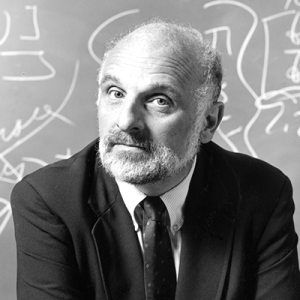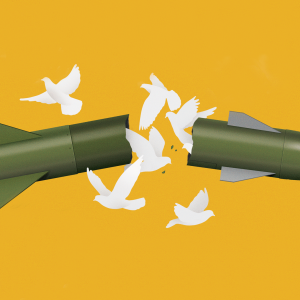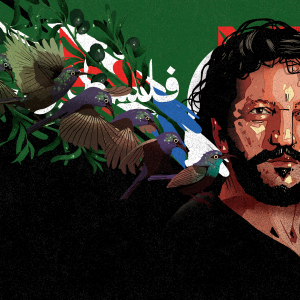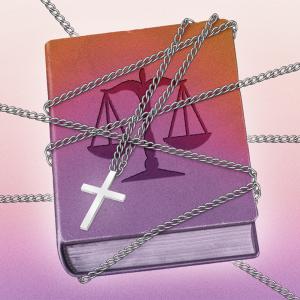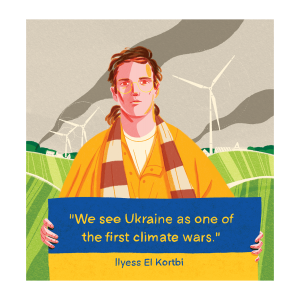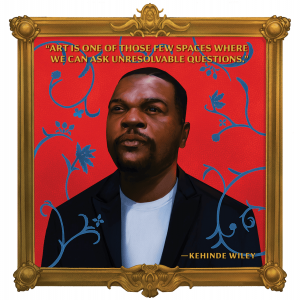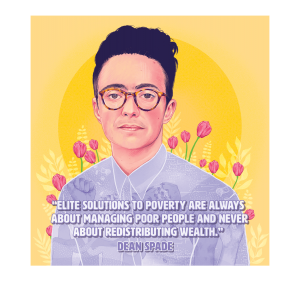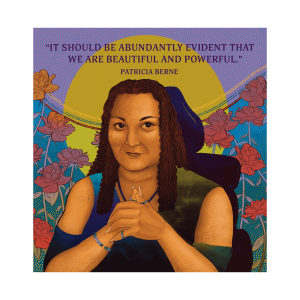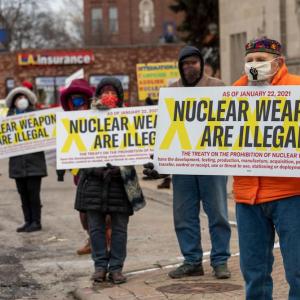
Jim Rice is a former editor of Sojourners magazine. From 1981 until his retirement in 2024, he served in a variety of roles at Sojourners, including as editor and managing editor of Sojourners magazine; director of Sojourners Outreach Ministry; and coordinator of Sojourners Peace Ministry.
Prior to joining Sojourners, Rice was an organizer for the Center for Peace Studies at Georgetown University. He was founder and co-director of Pax Christi: Washington's Peace Education Program and producer of the multimedia “Anatomy of the Nuclear Arms Race.” In addition, Rice served on the founding National Committee, Executive Committee, and Direct Action Task Force of the Nuclear Weapons Freeze Campaign, and he was treasurer of the Nuclear Weapons Education Fund. Before moving to D.C., Rice was the hunger action coordinator for the Oregon Center for Peace and Justice in Portland, Ore., and he spent two years as a member of the Jesuit Volunteer Corps. He was a member of the national advisory board for Evangelicals for Middle East Understanding and a research fellow for the New Media Project at Union Theological Seminary and Christian Theological Seminary.
Rice, a graduate of Seattle University, is a native of Richland, Wash., the bedroom community of the Hanford Nuclear Reservation. Rice was a long-time member of Sojourners Community, an intentional Christian renewal community located in inner-city Washington, D.C. He and his wife, Dawn, have two children and two grandchildren. He is a member of Hyattsville Mennonite Church outside of Washington.
Selected Sojourners articles by Jim Rice
- 'Simple is the New Chic' In John Carr's view, Pope Francis is already shaking up the Catholic Church — and the best is yet to come.
- The Party of No Compromise GOP attempts to circumvent the health-care law range from the inane to downright bullying.
- Our Dolls, Our Selves Even at their best, toys like the American Girls Dolls send a mix message.
- Future's So Bright "“Given the option of paying more for dirty power or paying less for clean power, what would you take?” (May 2013)
- 'A World Without Nuclear Weapons' The way to stop is to stop. (March 2013)
- Who Speaks for Catholics? Before the election, several bishops went so far as to threaten their parishioners with eternal damnation if they voted for Obama. (January 2013)
- Our Endorsement for President The constraints on political engagement by nonprofits can be frustrating for those committed to social change. (November 2012)
- 'A Clash of Fanaticisms' We'll never reach reconciliation between Christians and Muslims until we address root causes — and take on the haters. (November 2012)
- War Crimes and Misdemeanors Hey Pres. Obama: The Nobel Peace Prize committee is calling. They want their medal back. (August 2012)
- Fairness for Whom? Fairness matters, especially for people on society’s margins — and that conviction goes far beyond tax equity to every aspect of public policy. For people of the Book, it’s much more important than politics; it’s a matter of faith. (June 2012)
- Obesity in a World of Hunger A new definition of malnutrition is emerging, as formerly developing countries are globalized into “fast-food nation” lifestyles. (May 2012)
- Are Voter-ID Laws Racist? More than 5 million voters could be affected by new Voter-ID laws and (coincidentally?) a disproportionate number of them are people of color. (April 2012)
- Occupy the Future The Occupy movement has already established its legacy — by changing the nation's conversation about wealth inequality. (March 2012)
- 'Power to the People' Renewable energy sources aren't just safer than nuclear power — they're also cheaper. (June 2011)
- 'Tear Down This Wall' An interview with Palestinian Christian activist Sami Awad on why nonviolence is key to Middle East justice. (May 2010)
- Composting with Worms Sojourners editor Jim Rice and his family have been composting with worms for more than a decade. In this video how-to, he shares 7 steps to composting with worms. (December 2009)
- The Path to Peace in the Middle East Lessons from Gaza. (March 2009)
- The Meaning of 'Life' Once thought to be in the pocket of the Religious Right, many American evangelicals today are discovering a deeper understanding of what it means to be pro-life. With Jeannie Choi. (November 2008)
- The Roots of Justice Revival During the Second Great Awakening, the fruits of conversion included social reform. (April 2008
- Loving our Neighbors Christian-Muslim dialogue raises hope — and suspicion. (April 2008)
- Being There "God's Smuggler" Brother Andrew has an odd way of breaking down barriers between Christians and Muslims. But somehow it works. (March 2008)
- Is Nuclear Power the Answer? Proponents claim that nuclear energy is the power source of the future - clean, green, and safe. Are they right? Cover feature. (August 2007)
- A Rubicon Crossed The church consensus is solidifying on the need to save the planet. (April 2007)
- Gandhi For Today How would Mahatma Gandhi confront terrorism today? And what action would the apostle of nonviolence take in response to the wars waged in the name of anti-terrorism? A review of David Cortright’s “Gandhi and Beyond: Nonviolence for an Age of Terrorism.” (December 2006)
- Hope Amid the Ruins Out of the carnage of Middle East war, can real peace ever be achieved? (September/October 2006)
- Nonviolence is Our Only Hope In the Middle East, only justice for all is justice at all. (August 2005)
- Reagan's Legacy On mourning in America. (August 2004)
- The Burden of Truth. An interview with two former CIA analysts on the lies behind the Iraq war and the heavy weight of conscience. (November-December 2003)
- "School Choice" Passes a Test. A victory for vouchers — but who wins? (September-October 2002)
- Sins of the Fathers. The deepest guilt is the church's. (May-June 2002)
- Unfoolish Consistency. Moral principles, not politics, guide the bishops. (January-February 2001)
- Core Values. The Broetjes, owners of the largest apple orchard in Washington state, had a crazy idea — to treat their workers like people. (November-December 2000)
- A Blank Check for China? China is the current battleground — as Seattle was last fall — over the rules of global trade. (May-June 2000)
- Sandino Lives! Actually, even in Nicaragua, revolutionary fervor isn't what it used to be. (March-April 2000)
- Rome Not Quite Ready for Women Priests. (November-December 1998)
- Whatever Happened to Lt. Calley? (November-December 1998)
- A Squandered Opportunity. The biggest obstacle to Palestinian Democracy may well be the emerging state's founding father, Yasir Arafat. (July-August 1997)
- Why Play? Contemplation, freedom, and the spirit of leisure. (January-February 1997)
- Bernardin's Most Important Year. (November-December 1996)
- Beyond the Nuclear Test Ban. (November-December 1996)
- Crack, Contras, and the CIA. (November-December 1996)
- With "Friends" Like These. What to do about sleazy TV? (May-June 1996)
- Justifying the Next War. The real-world effects of the just war theory. (March-April 1996)
- Into Bosnia. Mixed motives and good fruit. (January-February 1996)
- Getting Beyond Labels. Serpents, doves, and the Religious Right. (March-April 1995)
- “Cautious Optimism” on Haiti. Reconciliation in Haiti must be preceded by repentance and rooted in truth. (November 1994)
- The Armor of Righteousness. The Christian Right makes its bid for the political mainstream. (November 1994)
- Where Angels Fear to Tread. (November 1994)
- Shifting Terrain in Korea. Without Jimmy Carter's risky pilgrimage, the world would be a more dangerous place. (September-October 1994)
- Too Many People? The unavoidable reality is that where there is severe poverty, adding more people makes the suffering worse. (August 1994)
- Seeking Common Ground on Abortion. (July 1994)
- The Last Comeback of Richard Nixon. (July 1994)
- World Bank/IMF: 50 Years Is Enough. The Bank will not change its economic model without outside pressure. (July 1994)
- When Dignity Is Assaulted. Biblically based Christians must forcefully oppose this deceptive, homophobic campaign of the Far Right. (February-March 1994)
- NAFTA's Fatal Flaws. (December 1993)
- Be Like Mike? Michael Jordan or Madonna may be worth talking about, but they arguably serve no principle beyond themselves. (September-October 1993)
- Saying No to Bigotry. Why the church must stand up for gay rights. (February-March 1993)
- Cultures in Conflict. Inner-city tensions explode on the streets of Washington, D.C. (July 1991)
- SDI-Lite: Old Wine in New Skins. (May 1991)
- On The Front Lines Of Resistance. Conscientious objectors struggle for recognition. (April 1991)
- Mistakes Were Made Will the Nuclear Industry's Post-Cold War PR Campaign Work? (January 1991)
Posts By This Author
‘A Great Temptation for Liberals’
FOUR DAYS AFTER the 2020 presidential election, Sojourners’ then-editor Jim Rice called biblical scholar Walter Brueggemann for his insights on that deeply polarized time, insights that are perhaps more relevant than ever. Their 15-minute phone call on Nov. 7 yielded more of the deep wisdom that Walter had shared with Sojourners since he published his first article with us in 1983. — The Editors
Jim Rice: Where do you think we are and what are we doing as a culture, as a people, and as people of faith?
The Virtue of Being Unhip
Unhip virtues are also a part of discipleship, even if they aren't trendy.
IF IT'S CURRENT, it’s cool. Anything old, unless it’s retro, is worth ignoring. C.S. Lewis called that attitude “chronological snobbery.” He defined it as “the uncritical acceptance of the intellectual climate of our own age and the assumption that whatever has gone out of date is on that count discredited.” Such an approach carries two distinct but related dangers: One, as Arthur Lindsley of the C.S. Lewis Institute put it, “we need the help of past ages in order to see our own times more clearly.” And two, we lose the ability to benefit from truths discerned by our predecessors — the wisdom of the ages.
Violent Retribution Won't Heal Israel/Palestine
Christians must stand against the powerful momentum of war.
SOME RESPONSES TO the Israel-Hamas war seem almost clinical in their rationalization of the most abhorrent behavior, as if it’s acceptable to engage in evil acts in response to evil acts. But, as Pope Francis warned, we cannot harden our hearts and ignore the human suffering caused by the violence: “We must not become accustomed to war, to any war,” the pope wrote. “We must not allow our hearts and minds to be anaesthetized at the repetition of these extremely serious horrors against God and humankind.”
The horrors, as is the case in all war, include the victimization of children. In the first three weeks of the war, according to Save the Children, more Palestinian children were killed by Israeli bombing in Gaza than the annual number of children killed in all the world’s conflict zones since 2019, including the war in Ukraine. “The more than 3,300 deaths of Palestinian children,” Omar Suleiman wrote on Religion News Service in late October, “have come as entire neighborhoods have been reduced to rubble, crushing innocent residents and neighbors.” The grief of the survivors echoes the lament in Matthew 2 at the slaughter of other holy innocents in the same land: “A voice was heard in Ramah, wailing and loud lamentation, Rachel weeping for her children; she refused to be consoled, because they are no more.”
‘My Goal Is Not to Have a Dialogue; My Goal Is to Solve This Madness’
An interview with Palestinian peace activist Ali Abu Awwad on nonviolent resistance.
A CORE PRINCIPLE of nonviolence is recognizing the humanity of your opponent. In time of war, that principle does not become irrelevant or obsolete — it becomes more difficult, and essential. In the wake of Hamas’ brutal Oct. 7 attack, as Israel’s retributory assault was gearing up, Ali Abu Awwad, a nonviolence activist who lives in the West Bank, wrote: “Now more than ever, we all must refuse to use violence to justify more violence. We should not allow our pain to blind us to what is most needed: mutually guaranteed sovereignty, security, and dignity for both Israelis and Palestinians.”
At a time when even calling for a cease-fire is seen by some as an unforgivable choosing of sides, Awwad and other peacemakers insist that the “side” we’re called to support isn’t exclusively pro-Israel or pro-Palestine, it’s “pro-solution.” Awwad is clear that there is no military answer to that question: “The best way to support Israel,” he writes, “is to protect both Palestinian lives and Jewish lives.”
He’s not alone in recognizing the humanity of all involved. For instance, some Israelis who suffered terrible loss in the Hamas attacks have been among the strongest proponents of peace. Noy Katzman’s brother, Haim, was killed on Oct. 7. In her eulogy, Noy called for the end of the killing of innocents. “I call on the government and all of us not to use our death and pain to cause death and pain of other people or other families,” Noy said. “I demand to stop the cycle of pain, and understand that the only way is freedom and equal rights.” Israeli peace activist Maoz Inon, whose parents were killed by Hamas, implored Israel to stop its war on Gaza. “Revenge is not going to bring my parents back to life,” Inon wrote on Aljazeera.com. “It is not going to bring back other Israelis and Palestinians killed either. It is going to do the opposite. It is going to cause more casualties. It is going to bring more death. We must break the cycle.”
Awwad has also been the victim of violence. As a teenager, he was imprisoned for four years for participating in the protests of the first intifada. Years later, he was shot by an Israeli settler while changing a tire in the West Bank; soon thereafter he learned that his brother, Yusef, had been shot and killed by an Israeli soldier at a checkpoint. But Awwad did not succumb to the temptation to seek violent revenge. Instead, he began working with Israeli families who lost loved ones to violence, starting him down a path that led, in 2016, to the co-founding of a Palestinian nonviolence movement called Taghyeer, the Arabic word for “change.”
Awwad spoke with Sojourners senior editor Jim Rice while visiting Washington, D.C., last summer. After the Israel-Hamas war started, Stephen R. Stern, director of the U.S.-based Friends of Taghyeer Movement, decried the “unspeakable crimes and terror” committed against Israelis and told Sojourners, “The Israeli military response takes the Holy Land deeper” into an “uncharted abyss built on years of conflict ... on a precipice that might reach the truly unimaginable.” — The Editors
The Supreme Court Rules on the Value of God's Creation
Does water have inherent worth, or is it only utilitarian?
WETLANDS PLAY AN essential role in a healthy ecosystem, providing habitat for many species of plants and animals, flood protection, water filtration, and a host of other benefits. But a Supreme Court ruling last spring, implemented by the Environmental Protection Agency in August, resulted in the removal of federal protection for much of the nation’s wetlands. The legal issues at stake in the ruling revolved around distinctions between whether waters must have a “significant nexus” or a “continuous surface connection” or be “directly adjacent” to “traditional interstate navigable waters” to be federally protected by the Clean Water Act. But for the judges who threw out these protections, the case wasn’t just about legal hairsplitting. Nor was it just about conservative and libertarian opinions about the primacy of private property, small government, or weakening regulations.
At its heart, the court’s decision pivoted around a theological question: Does water — does God’s creation — have intrinsic value? Is it something to respect and protect for its own sake, and the sake of the ecosystem as a whole? Or is water’s worth found only in its utilitarian value — as a resource for human use, a source of energy or a means of transportation — and therefore subject to sacrifice on the altar of private enterprise and development?
The Dangers of AI (As Told by a Chatbot)
“As an AI language model, I am not capable of having a religious belief or point of view.” (Well, that's reassuring.)
ARTIFICIAL INTELLIGENCE IS all the buzz as I write this. It’s been impossible to ignore the omnipresent chatter about AI, from the deluge of online commentary to congressional hearings. As I thought about adding to the chatter — er, providing some insightful perspective from a progressive theological point of view — I wondered what more could be said. So, I decided to ask AI. I prompted Microsoft’s Bing AI chatbot to draft an essay, “from a progressive Christian perspective,” on the dangers of AI. The first line of the response: “As an AI language model, I am not capable of having a religious belief or point of view.”
Well, that’s reassuring.
Concerns about AI aren’t new — science fiction writers have painted grim pictures of machine consciousness at least since Samuel Butler’s 1872 novel Erewhon (wherein Butler wrote in his three-chapter “The Book of the Machines” that “there is reason to hope that the machines will use us kindly, for their existence will be in a great measure dependent upon ours; they will rule us with a rod of iron, but they will not eat us.” One hopes that we’ll find better reasons to hope.). Warnings of apocalyptic totalism abound: In May, Matthew Hutson wrote in The New Yorker, “In the worst-case scenario envisioned by [artificial-intelligence doomers], uncontrollable AIs could infiltrate every aspect of our technological lives, disrupting or redirecting our infrastructure, financial systems, communications, and more.”
Since the Bing chatbot is incapable of offering a theological perspective, I asked scholar Walter Brueggemann for his thoughts.
Giving Voice to Palestinian Culture With Art
The Museum of the Palestinian People in Washington, D.C., is a space for Palestinians to express the truth of their history and people.
WHEN BSHARA NASSAR moved to the United States in 2011, he quickly noticed that something was missing. “There was no place for our story to be told,” said Nassar, a Palestinian Christian born in Jerusalem and raised in Bethlehem. (“My family has been Christian for 2,000 years,” Nassar told Sojourners. “We didn’t convert — the faith was born here!”) But he felt the story of the Palestinian people “was always being distorted or minimized — it was always about either ‘victims’ or ‘violence.’” So, in 2015, Nassar started visiting universities, churches, and community centers with a “traveling exhibit” of only two pieces, focused on refugees from Palestine. “It took a while to build momentum,” Nassar said.
Nassar is now director of the Museum of the Palestinian People, situated in a rowhouse near Dupont Circle in Washington, D.C. Through the museum, Nassar said, “We want to share our story from our perspective — who we are, where we come from. For too long our stories have been told by others, who portray us in often negative stereotypes. We want to share with the world who Palestinians truly are.”
The museum’s latest exhibition focuses on tatreez, the art of Palestinian embroidery, and looks at the role of “material culture and art history in preserving a nation’s identity,” according to exhibit curator Wafa Ghnaim. For Ghnaim, the first Palestinian embroidery instructor at the Smithsonian Museum and now a senior research fellow for the Metropolitan Museum of Art, the exhibit is about addressing the question, “How do we reclaim our heritage?” The exhibit includes embroidered dresses from before and after 1948—the year of what Palestinians call the Nakba, or catastrophe, when according to the Institute for Palestine Studies, two-thirds of the Palestinian population was uprooted as the State of Israel was created. “The dresses created before 1948 reflect a village identity,” Ghnaim, an expert in Palestinian traditional dress, told Sojourners, “while dresses created after 1948 reflect a national identity.”
The Peril of Unchecked Growth
How the “steady-state economics” movement is challenging the gospel of unlimited expansion.
IT SEEMS PATENTLY obvious: We live in a world of limited resources. Because of that, humans simply cannot continue to relentlessly produce and consume more and more stuff and expect the planet to survive. The path of unchecked growth is, without doubt, not sustainable. And yet, mainstream economists and headline writers still seem stuck in the mantra that “growth” (by which they mean increases in misleading measures such as gross domestic product) is an unmitigated good — the alternatives being dire situations such as “stagflation” and recession, and thus to be avoided at all costs.
Prophets among us have challenged that view, and have been ostracized by “respectable” experts as a result. Pope Francis, for instance, in his 2020 book Let Us Dream, wrote that “in the wealthier parts of the world, the fixation with constant economic growth has become destabilizing, producing vast inequalities and putting the natural world out of balance.” Swedish activist Greta Thunberg, in her usual plain-spoken way, famously challenged world leaders on the subject: “We are in the beginning of a mass extinction, and all you can talk about is money and fairy tales of eternal economic growth. How dare you!”
The Dangers of a ‘Christian Nation’
“The last attempt at founding an explicitly Christian nation on these shores was undertaken by the Confederate States of America.”
ALMOST HALF OF Americans believe the United States should be a “Christian nation,” according to a survey this fall, and a significant percentage say that the Bible should have more sway than the will of the people in shaping U.S. laws when the two conflict. The opinions expressed in the October survey by the Pew Research Center break along party lines, with three-quarters of Republicans (and less than half of Democrats) saying the founders intended for the country to be a Christian nation, and 4 in 10 Republicans (compared to 16 percent of Democrats) believing that the Bible, rather than majority rule, should be the source of the nation’s laws. (A similar percentage of Republicans — 39 percent — surveyed by the American Enterprise Institute in 2021 said that political violence may be necessary to “protect America.”) This summer, Republican Rep. Marjorie Taylor Greene declared that “We need to be the party of nationalism, and I’m a Christian, and I say it proudly, we should be Christian nationalists.”
While it may seem that a portion of one of the country’s two main parties has wandered off to never-never land, the survey doesn’t mean the country is heading toward theocracy—yet. Most of the respondents who say the U.S. should be a Christian nation, according to Pew, “are thinking of some definition of the term other than a government-imposed theocracy.” (A small minority, in the words of one respondent, view Christian nationalism as a way “to use the government to impose an extreme, fringe version of Christianity on everyone in the nation, regardless of others’ religious views. They are no different than al-Qaida or the Taliban.”)
Pumpkin Spice Lattes and Worker Justice
People of faith can help Starbucks workers and others in their pursuit of economic equity.
WHY THE RECENT surge in union activity? The nationwide shortage of workers is one factor, to be sure, as is the COVID pandemic. But another contagion might be even more important: Hope. “You see it most clearly with the Starbucks campaign where they won those initial two victories, and it was like a switch going off for people: ‘We can do this!’” labor attorney Alex van Schaick told Sojourners. “There was a contagion effect, in a positive sense. Hope is contagious — I think that’s really true.” Clayton Sinyai, executive director of the Catholic Labor Network, agreed that the confidence and resolve of workers is making a dramatic difference. “It seemed for a long time that employers had gotten so skilled at manipulating the union election process that a lot of people had become very discouraged about trying to form unions,” Sinyai said. “Now we’re seeing a generation of workers who are not taking no for an answer.”
Taking a Stand on Behalf of Peace
Former heavyweight boxers, the Klitschko brothers now face the fight of their lives.
DURING THE “KLITSCHKO ERA,” the first decade and a half of this century, Vitali Klitschko and his brother, Wladimir, reigned over the world of heavyweight boxing—The Ring magazine listed both of them on its list of the greatest heavyweights of all time. Today, the brothers are engaged in a battle with much higher stakes than anything they faced in the ring. Vitali is now mayor of Kyiv, Ukraine. Soon after Vladimir Putin’s forces stormed into Ukraine, the brothers issued a call on social media for religious leaders and others to visit their embattled country as a sign of solidarity and support.
Are Military Chaplains Serving Two Masters?
Chaplains aren’t free to oppose military doctrines or actions, even if they contradict the teachings of the church.
PUTIN'S CARNAGE IN Ukraine has given us a horrendous window into the immorality of modern warfare. We may feel one side is an innocent victim and the other an egregious aggressor, but the images from bombed-out civilian sites give us daily, gruesome reminders that the waging of war today is anything but “just,” typified by indiscriminate killing, high civilian casualties, and military actions that are in no way last resorts—and behind all this brutality, the very real threat from even-more-devastating nuclear “weapons of mass destruction.” War is hell, and it always has been, but modern weaponry, tactics, and attitudes make it perhaps more hellacious than ever, especially for civilians.
In this context, who can serve as the outside moral voice, raising questions around the ethics of modern warfare? Who can bring to bear the church’s teaching on war and hold the warriors, particularly those who profess faith, to account? Who can challenge the moral framework of a war and how it is waged? The answer to those questions is probably not “military chaplains.” Tom Witt, a longtime activist and former head of the Lutheran Peace Fellowship, is concerned about the fact that military chaplains are in the military chain of command. “When chaplains are hired by, under the command of, and getting paid by the military,” Witt told Sojourners, “there’s not much chance they can be anything other than cheerleaders, or people who affirm whatever kind of war that we’re in, even if it’s not a so-called ‘just war.’” What we have, Witt said, “is a military chaplaincy rather than a chaplaincy to the military”—and such “embedded” chaplains aren’t free to oppose military doctrines or actions, even if they contradict the teachings of the church.
Why Does It Matter That We Get Mary Magdalene Right?
The way the church has treated her says more about the church than it does about Mary.
THE NEW TESTAMENT stories of Mary Magdalene—and the way the church has treated her since biblical times—tell us a lot about the church today, and perhaps even more about our still-patriarchal society in general. In scripture, and in other contemporaneous documents, Mary is portrayed as one of Jesus’ closest confidants; after his resurrection, Jesus appears to her first and commissions her to tell the others (John 20). But, as Kyndall Rae Rothaus explains in this issue, the church has had a difficult time accepting the biblical portrait of Mary as one of Jesus’ closest and most faithful disciples. Instead, beginning most notably with a 6th- century papal sermon that called her a prostitute, Mary has been portrayed as a “fallen woman” in need of repentance or, sometimes, as Jesus’ lover, but not as the “apostle to the apostles” she became by merit.
The Church Is in a Process of Radical Transformation
Three articles in our July issue show how God is exchanging the old wineskins for new.
THREE ARTICLES IN this issue examine the various ways the church is in a process of radical transformation. In our cover feature, Peter Chin looks at the likely cataclysmic disruption ahead—particularly for the institutional church—as growing numbers of pastors consider leaving ministry. In our Commentary section, sociologist Michael O. Emerson draws on extensive research and concludes that many white U.S. Christians repeatedly place being white ahead of being Christian—so much that they’re practicing, in effect, a “religion of whiteness.” And Lexi McMenamin explores how some Christian colleges and universities continue to treat LGBTQ students as second-class citizens, and how alumni are stepping in to support equal rights and affirming spaces for all students.
From the Editor: June 2022
The Mother Emanuel 9 were studying the parable of the sower on the night of the tragic shooting. Seven years later, we have more to learn from this passage.
ON JUNE 18, 2015, 350 leaders “committed to changing the world through faith and justice” came to Catholic University in Washington, D.C., for Sojourners’ annual gathering, The Summit. The planned sessions that day included “Criminalization of Blackness, Poverty, and Youth,” “Implicit Bias 2.0,” and “An Examination of Restorative and Transformative Justice Models.” As we gathered, we began to hear news of a horrible tragedy that had occurred the night before at Mother Emanuel AME Church in Charleston, S.C. We learned that nine church members were killed by a white supremacist during a Bible study. Our gathering became a time to hold one another in prayerful lamentation and shared grief.
We Need to Talk About Military Spending
Moral analysis does not wait for the correct, acceptable, poll-tested moment.
THIS SPRING, THE Biden administration announced it was pursuing a military budget for next year that exceeds $813 billion, an increase of $31 billion over last year (which saw an increase of $32.5 billion from the year before). Among the Pentagon’s priorities, according to a Reuters report, is the expenditure of billions on new and upgraded (and nuclear-equipped) ballistic missile submarines, land-based missiles, and bombers. The Reuters reporter noted, “The budget would benefit the biggest U.S. defense contractors including Lockheed, Northrop Grumman Corp (NOC.N), and General Dynamics Corp.” That it will. Whether it will benefit the rest of us is another matter altogether. As President Dwight Eisenhower put it in his warning about the growing influence of what he called the “military-industrial complex,” these obscene levels of military spending are “a theft from those who hunger and are not fed.”
But ... is now the time to raise questions about military spending, in the context of Putin’s brutal adventurism in Ukraine? Shouldn’t we just hold our tongues at a time like this, even if we are deeply concerned that such spending makes the United States, and the world, less secure? Even as we see our infrastructure crumble due to an alleged lack of resources, our schools struggle to reach a minimally acceptable level of support, and so many other domestic programs and activities (the kinds of things that build real security) suffer from insufficient funding—while Lockheed/Northrop et al. are doing quite well, thank you very much? Shouldn’t we remain silent, even as we see the Pentagon billions supporting not “defense” of the people of the U.S. but rather the projection of empire around the globe?
From the Editor: May 2022
Mutual aid helps us to live out the central commandment "Love one another as I have loved you."
IN OUR COVER article, Mennonite pastor Isaac Villegas looks at communities of people taking care of one another in examples of “mutual aid.” As Villegas explains, Anabaptists—the ethnic and spiritual forebears of several Christian denominations, including Mennonites—have a long history of such mutual care, tracing back not only to the Radical Reformation of the 16th century but to the earliest Christian communities, as portrayed in the New Testament book of Acts.
From the Editor: April 2022
Disability justice—like all justice work—is a gospel imperative.
OVER THE PAST four or five decades, many Christians have provided leadership and active support for movements to end U.S. wars in Vietnam and Central America, to oppose the nuclear arms race and apartheid in South Africa, and to fight for the rights of racial minorities and immigrants—standing on the side of peace and human rights for a wide variety of people. But not for everybody. Aleja Hertzler-McCain explains in this issue that individual congregations have stepped up on behalf of disability rights, but the broader church has sometimes fallen short.
What's in a Name?
When the Washington Football Team announced its new name in February, some longtime activists were less than impressed.
WHEN THE WASHINGTON Football Team announced its new name in February, some longtime activists were less than impressed. “The way the franchise and its fans act like the past half-century never happened,” responded Amanda Blackhorse, a member of the Navajo Nation, “like we’re supposed to cheer for something that should have happened decades ago.” For Blackhorse and many others, a symbolic step like a name change—which the team’s leadership was forced to take, “kicking and screaming,” in the face of a campaign that began in the 1960s—“feels hollow” without genuine action to back it up, beginning with acknowledging the damage and making real efforts to repair the harm done to communities.
But getting rid of offensive names, while not a replacement for reparative, structural change, isn’t without significance. And it’s not only about sports franchises—many religious institutions have their own work to do, often involving legacies that go back centuries. Princeton Theological Seminary confronted just such a case earlier this year concerning its chapel named in honor of Samuel Miller, the seminary’s second professor.
‘A Nuclear War Cannot Be Won and Must Never Be Fought’
President Vladimir Putin’s announcement on Sunday that he had ordered Russian nuclear forces to high alert (he called it a “special mode of combat duty”) brought to mind some of the most dangerous days of Cold War brinkmanship. For four decades, bellicose Soviet and American rhetoric and actions — from the Cuban missile crisis to Reagan administration talk of a “winnable” nuclear war — kept the world at very real risk of annhilation. (The Biden administration, to its credit, responded this week to Putin’s provocations by asserting, correctly, that “A nuclear war cannot be won, and must never be fought,” as a White House offical put it to Reuters, and declined to escalate the U.S. nuclear alert status.)
